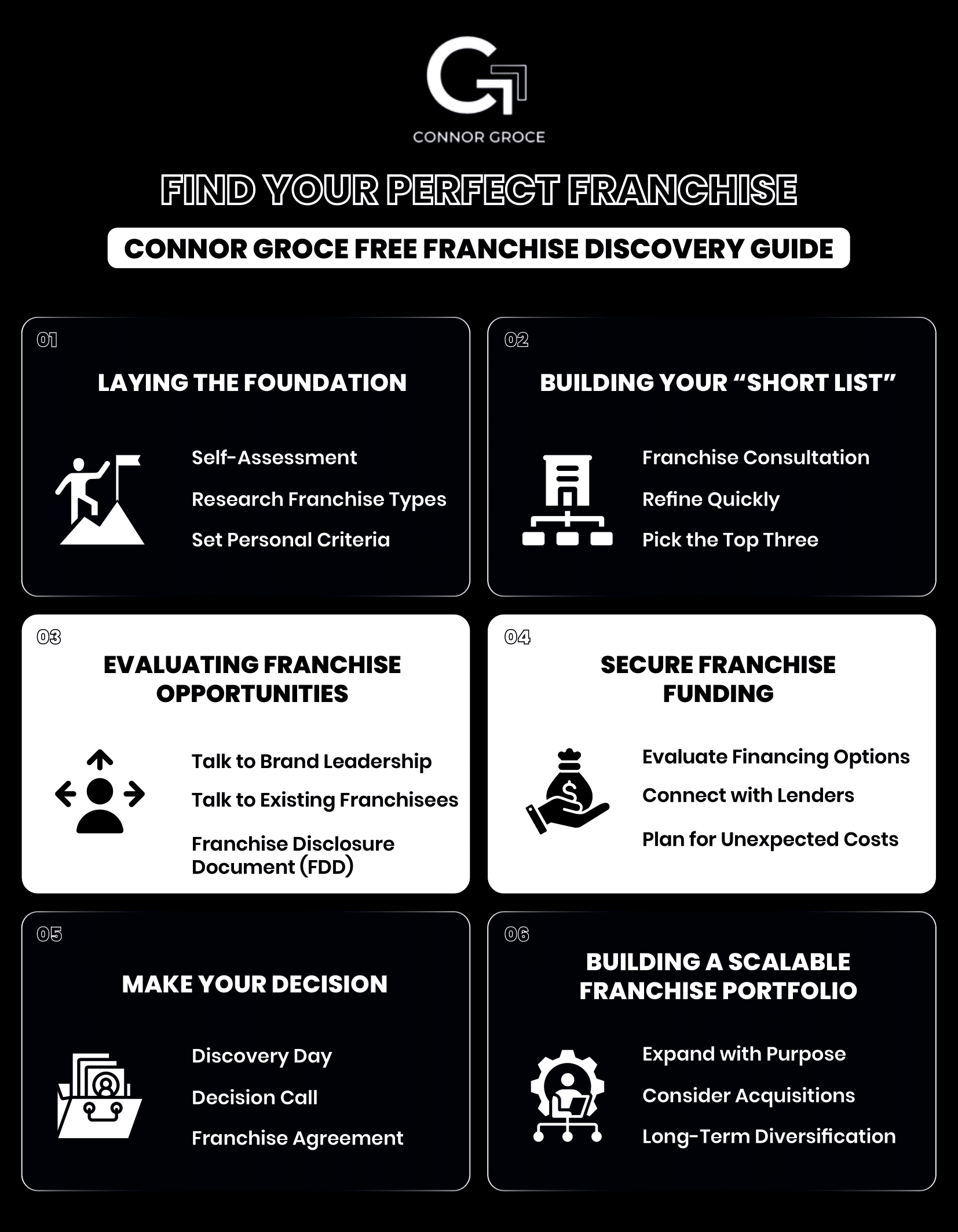The Ultimate Checklist for First-Time Franchise Owners: Avoiding Common Pitfalls
Through this checklist, I’ll help you avoid common mistakes, identify the right opportunities, and prepare for long-term success.

Entering the world of franchise ownership can be both exciting and overwhelming, especially for first-time buyers. Franchising offers an excellent path to business ownership, providing established systems, brand recognition, and ongoing support. However, without proper preparation and research, aspiring franchisees may face unexpected hurdles that could jeopardize their success.
As someone who's been in your shoes, I’ve made it my mission to guide others on their journey to franchise ownership. Through this checklist, I’ll help you avoid common mistakes, identify the right opportunities, and prepare for long-term success. Whether you're a corporate professional making the leap into entrepreneurship, a seasoned business owner looking to expand, or a young empire builder with big dreams, this guide is your roadmap to starting strong.
1. Understand Your Why: Define Your Franchise Goals
Before diving into franchise ownership, take a step back and ask yourself why you want to own a franchise. Your motivation will shape every decision you make moving forward. Are you seeking financial independence, a better work-life balance, or a long-term investment?
Common Pitfalls:
- Unclear goals: Many first-time franchise owners dive into the process without clear goals, leading them to choose a franchise that doesn’t align with their lifestyle or financial aspirations.
Solution:
- Define your objectives: Whether it’s full-time commitment or passive income, be crystal clear on what you expect from your franchise ownership. This clarity will guide you in selecting the right opportunity.
2. Research the Franchise Industry
Franchises span a wide range of industries, from fast food and fitness to education and home services. Knowing which industry suits your interests, experience, and market demand is essential for long-term success.
Common Pitfalls:
- Choosing based on trends: Many new owners are tempted to invest in franchises that are popular at the moment but may not be sustainable in the long run.
- Underestimating the competition: Some markets may be oversaturated, making it harder for a new franchise to stand out.
Solution:
- In-depth industry research: Take time to explore various franchise industries, their growth potential, and competition. Analyze current trends, but also consider their long-term viability. My team specializes in helping you identify sustainable industries that align with your skills and goals.
3. Assess Your Financial Readiness
One of the most critical steps in your journey to franchise ownership is understanding the financial commitment involved. Franchises typically require an upfront investment, and you must account for ongoing operational costs, marketing fees, and royalties.
Common Pitfalls:
- Underestimating total costs: Many first-time franchisees only consider the initial franchise fee, overlooking other crucial costs such as equipment, inventory, and staffing.
- Inadequate capital reserves: Some owners fail to have enough working capital to sustain their business during the initial months or years.
Solution:
- Develop a financial plan: Work with a financial advisor or franchise consultant to create a detailed financial plan, outlining all upfront and ongoing costs. Ensure you have enough capital to cover at least 6-12 months of expenses, including living costs, to avoid unnecessary financial strain.
4. Evaluate Franchise Opportunities Thoroughly
With over 3,000 franchise opportunities available, it’s crucial to evaluate each one carefully to find the best fit for you. This involves not only looking at the potential for profitability but also understanding the business model, support system, and your role as an owner.
Common Pitfalls:
- Falling for the franchise sales pitch: Many prospective franchisees are swayed by attractive marketing materials or a charismatic franchise representative, without fully understanding the business.
- Ignoring franchise agreement details: Some first-time buyers don’t pay enough attention to the legal aspects of franchise agreements, which can contain binding clauses regarding fees, operations, and termination.
Solution:
- Work with an expert: As someone who has guided hundreds of aspiring franchise owners, I can help you evaluate franchise options, review agreements, and ask the right questions. We’ll ensure you’re choosing a franchise that fits your goals, budget, and lifestyle, not just one that looks appealing on the surface.
5. Secure Funding for Your Franchise
Once you’ve identified your franchise, the next step is securing funding. This may include personal savings, small business loans, SBA loans, or franchise financing options.
Common Pitfalls:
- Limited funding options: Some new owners rely solely on personal savings or don’t explore all available financing avenues.
- Choosing the wrong financing plan: High-interest loans or unfavorable terms can put unnecessary pressure on your new business.
Solution:
- Explore financing options: Whether it’s an SBA loan, franchise-specific financing, or personal investment, we’ll guide you through the process to secure the best terms. This way, you can focus on growing your business instead of worrying about financial constraints.
6. Understand Your Role as a Franchise Owner
Franchise ownership requires a hands-on approach, especially in the early stages. While franchisors provide systems, training, and support, the day-to-day operations are your responsibility. Your level of involvement depends on the franchise model and your personal goals.
Common Pitfalls:
- Underestimating the time commitment: Some first-time franchisees believe the franchise will run itself, only to realize the demands of managing staff, operations, and customer service.
- Unclear expectations: Not understanding the full extent of your role can lead to frustration and mismanagement.
Solution:
- Know your involvement: Be honest with yourself about how much time you’re willing and able to dedicate. If you want a more passive role, look for semi-absentee franchise models. If you’re ready to dive in full-time, make sure the franchise supports that level of commitment.
7. Build a Strong Support System
Franchise ownership doesn’t have to be a solo journey. Surround yourself with the right people—whether that’s a business mentor, franchise consultant, or a community of like-minded entrepreneurs. Building a support network is crucial for navigating challenges and celebrating your successes.
Common Pitfalls:
- Going it alone: Many first-time franchise owners try to handle everything themselves, leading to burnout and missed opportunities.
Solution:
- Join a community: At [Company Name], we foster a community of franchise owners who support each other through every stage of the journey. You’ll gain access to ongoing coaching, networking opportunities, and resources to ensure you have the tools to succeed.
8. Develop an Exit Strategy
While the goal of franchise ownership is long-term success, it’s essential to plan for the future, including an eventual exit or transition. Whether you plan to sell your franchise, pass it on, or grow it into a multi-unit operation, having a clear exit strategy is key.
Common Pitfalls:
- No exit plan: Many franchise owners fail to consider their long-term goals or how they will eventually transition out of the business.
Solution:
- Create a roadmap: From the very beginning, we help you map out your future. Whether you want to scale your franchise empire, sell to private equity, or retire, we’ll ensure your exit strategy aligns with your personal and financial goals.
9. Take Advantage of Franchise Training and Support
Most franchisors offer comprehensive training programs for new franchisees, covering everything from operations to marketing and sales. Take full advantage of this training to ensure you’re equipped to run your business efficiently.
Common Pitfalls:
- Not fully engaging in training: Some new franchisees treat training as an afterthought, which can lead to costly mistakes down the road.
Solution:
- Commit to learning: Your franchisor’s training and support systems are there to set you up for success. Engage fully in the process, ask questions, and implement the best practices they provide.
10. Stay Adaptable and Be Willing to Learn
Franchise ownership is an ongoing learning process. No matter how much research or preparation you do, challenges will arise, and the industry will continue to evolve. The most successful franchisees are those who remain adaptable, open to new ideas, and committed to continuous improvement.
Common Pitfalls:
- Resistance to change: Some franchisees struggle when faced with unexpected challenges or new business trends.
Solution:
- Embrace change: Stay ahead of the curve by continuing to educate yourself, seeking mentorship, and adapting to industry trends. My team is here to provide ongoing guidance and ensure you’re always on the cutting edge of franchise success.
Ready to Take the Next Step?
Owning a franchise can be a life-changing opportunity, but only if you enter it with the right preparation and mindset. By following this ultimate checklist, you can avoid common pitfalls and set yourself up for long-term success.
At Connor Groce, we specialize in guiding first-time franchise owners through every step of the journey—from choosing the right franchise to scaling and growing a successful business. If you’re ready to turn your franchise dreams into reality, take our free franchise quiz and book a consultation today!
Let’s unlock your path to successful franchise ownership together.
SUBSCRIBE
And get content like this straight to your inbox.
All Rights Reserved | Connor Groce | Powered by AutomationLinks
All Rights Reserved | Privacy Policy | Connor Groce | Powered by AutomationLinks



